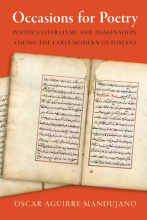The Department of Middle Eastern Languages and Cultures recently celebrated its third annual Walter G. Andrews Lecture, featuring an insightful exploration of Ottoman literary traditions. This event was made possible thanks to the generous contributions from our community supporters of the Turkish and Ottoman Studies Program. Recordings of the previous two lectures are available for viewing on the MELC Department's YouTube channel: the inaugural lecture by Dr. Michael Pifer from the University of Michigan in 2022, and the second by Dr. Didem Havlioğlu from Duke University in 2024.
Dr. Oscar Aguirre Mandujano, a PhD graduate from the University of Washington's Interdisciplinary PhD Program in Near and Middle Eastern Studies, delivered an engaging presentation centered around his recent book, Occasions for Poetry: Politics, Literature, and Imagination Among the Early Modern Ottomans. His talk paid homage to the academic legacy of Professor Walter Andrews who co-advised Aguirre Mandujano and co-authored an article with him.
In his lecture, Aguirre Mandujano unveiled the complex realm of Ottoman poetry during the transformative years between 1453 and 1512, a period marked by substantial imperial growth and cultural evolution. He argued that poetry served not just as artistic expression but it was a vital political and social tool that enabled Ottoman elites to communicate, negotiate, and shape their developing imperial identity.
The speaker emphasized how Turkish poetry emerged as the primary language of intellectual discourse, overtaking Persian and Arabic in literary and bureaucratic contexts. Through meticulous analysis of poetic works, Aguirre Mandujano illustrated how poets navigated personal and political challenges, addressing themes from exile to intricate court dynamics.
Notably, he explored how figures like Ottoman prince Cem [pronounced Jém] Sultan utilized poetic language to voice political aspirations, personal anguish, and hopes for return during times of displacement before his tragic end. The lecture revealed poetry as a sophisticated mechanism for understanding the emotional and political landscape of the early Ottoman Empire.
During an engaging question-and-answer session, audience members—including Aguirre Mandujano's former mentors—delved into the deeper implications of his research. Topics covered ranged from the interplay between Ottoman and Persian poetic traditions to the broader cultural significance of literary creation within imperial governance. He ended his lecture stating that: "One of the things I tried to show in the book is poetry was one way in which [Ottomans] were able to imagine themselves as part of that big unknown that was the present time and Empire at large. So maybe recognizing those moments of ignorance and limitations, allows us to see how poetry and identity was being shaped, again, not monolithically, but rather as a constant act of negotiation."
Associate Professor Selim Kuru, who introduced the speaker, highlighted the lecture's importance in continuing the scholarly legacy established by Walter Andrews, a trailblazer in the study of Ottoman literary history.
This event not only celebrated groundbreaking scholarship but also honored the collaborative spirit and intellectual curiosity that characterized Walter Andrews' scholarly approach. By bridging historical analysis with literary interpretation, Dr. Aguirre Mandujano provided a captivating glimpse into the rich intellectual tapestry of the Ottoman Empire.
Supported by community contributions and organized by the Turkish and Ottoman Studies Program, this lecture series continues to offer a platform for innovative scholarship and deep cultural understanding, reflecting the academic excellence of MELC Department.
